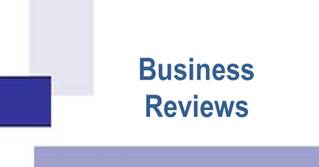What is Business Review?
Business reviews establish a performance baseline by undertaking an impartial and independent assessment of the way you process transactions, your cost base, how you are organised, and how you forecast, plan and report on activity.
Who are they for?
All organisations can benefit from an independent assessment and its associated recommendations. Some are larger than others and some more effective and efficient than others. However, there is always room for improvement no matter what the size or history.

Business Review Essentials
|
What are they? |
What do you get? |
Where is the value? |
What do they cost? |
|
A short and targeted review of a problem process, planning and reporting issue, an IT system or performance management challenge |
A concise report and/or presentation providing a summary of the problem area and a set of recommendations. |
Delivers an independent baseline and evidence based validation of issues. |
Costs will vary according to the size, nature and complexity of the problem area, and the agreed terms of reference. |
|
Typically consists of management and staff interviews, transactional audits, general observation activities and some limited data analysis |
An assessment of what cost savings or performance improvements might be achieved on an implementation of the recommendations. |
Facilitates discussion on remedial strategies. |
Smaller clients prefer a clearer idea of what they will get for their money before a commitment is made. Indicative costs can be provided at an initial meeting. |
|
Ensures that internal staff are involved and yet remain undistracted from day-to-day activities |
|||
|
Enables comparison with best practice (or ‘sound and reasonable practice’) solutions deployed elsewhere. |
Costs & Types of Business Review
As with legal and accounting services, costs are primarily driven by the time taken to undertake the review and deliver the findings and recommendations. This in turn is entirely dependent on the size of the business challenge and the terms of reference agreed at the outset. Expenses can also be involved if site visits to remote sites are required. Smaller clients tend prefer a ‘package’ or fixed cost solution rather than be confronted with an open-ended ‘day rate’ approach favoured by some management consultancies. This can be agreed as part of the engagement and negotiation process.
Once the review findings have been validated internally a date for sharing them is agreed. Traditionally these have been provided in the form of a written report although it is far more common for the outputs to be delivered in the form of a summary presentation with detailed appendices, primarily to keep costs lower. Recommendations, benefits and the estimated costs of undertaking improvements is usually an integral part of the findings presentation. If the proposals are agreeable the terms of engagement are revised and a written confirmation of start-up proposals are provided to the client.
There are also sometimes situations where clients have already conducted their own internal review, and do not feel that an independent dms review will add any new insights. Clients have usually assessed the issues and have estimated the amount of time a solution will take to deliver. Where a client still seeks some additional implementation help a day rate basis is usually agreed in these situations.
For smaller clients dms has ‘packaged’ its business reviews into two types, a ‘Basic’ review usually looking at a specific area and taking only two weeks, and an ‘Extended’ review, generally a four to five week undertaking. Basic and Extended reviews are described in more detail here:
Darwen Management Services
Management Consultancy & Interim Solutions

Darwen Management Services Ltd Registered Address 23a Railway Rd, Darwen BB3 2RG Company Number 4189531.
This is the legacy website of Darwen Management Services Ltd
‘Improving Performance;
Delivering Change’
